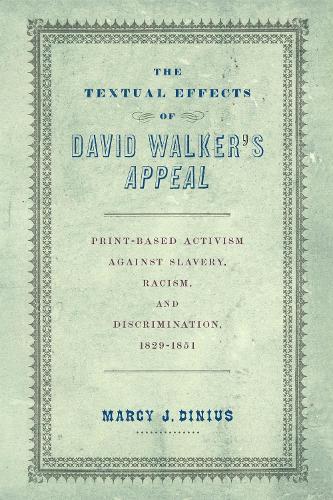Overview
Historians and literary historians alike recognize David Walker's Appeal to the Coloured Citizens of the World (1829-1830) as one of the most politically radical and consequential antislavery texts ever published, yet the pamphlet's significant impact on North American nineteenth-century print-based activism has gone under-examined. In The Textual Effects of David Walker's ""Appeal"" Marcy J. Dinius offers the first in-depth analysis of Walker's argumentatively and typographically radical pamphlet and its direct influence on five Black and Indigenous activist authors, Maria W. Stewart, William Apess, William Paul Quinn, Henry Highland Garnet, and Paola Brown, and the pamphlets that they wrote and published in the United States and Canada between 1831 and 1851. She also examines how Walker's Appeal exerted a powerful and lasting influence on William Lloyd Garrison's Liberator and other publications by White antislavery activists. Dinius contends that scholars have neglected the positive, transnational, and transformative effects of Walker's Appeal on print-based political activism and literary and book history-that is, its primarily textual effects-due to an enduringly narrow focus on the violence that the pamphlet may have occasioned. She offers as an alternative a broadened view of activism and resistance that centers the works of Walker, Stewart, Apess, Quinn, Garnet, and Brown within an exploration of radical forms of authorship, publication, civic participation, and resistance. In doing so, she has written a major contribution to African American literary studies and the history of the book in antebellum America.
Full Product Details
Author: Marcy J. Dinius
Publisher: University of Pennsylvania Press
Imprint: University of Pennsylvania Press
ISBN: 9781512828801
ISBN 10: 1512828807
Pages: 312
Publication Date: 11 November 2025
Audience:
College/higher education
,
Tertiary & Higher Education
Format: Paperback
Publisher's Status: Active
Availability: Not yet available

This item is yet to be released. You can pre-order this item and we will dispatch it to you upon its release.
Reviews
""The Textual Effects of David Walker's Appeal is a deeply researched study of the many ways that Walker's Appeal to the Coloured Citizens of the World (1829; 1830) influenced Black and Indigenous writers from the 1830s to the 1850s. While scholars have long studied the rippling political effects of Walker's incendiary publication, including the passage of antiliteracy laws and the censoring of abolitionist periodicals in southern states, this is the first study to focus on the works of print by writers of color who were directly influenced by Walker's manifesto...Dinius does the field an important service by showing that the Appeal was not a one-off publication written by a political fanatic but a deeply learned text invested in both the powers of Black self-education and intellectual inquiry and one that would become a touchstone for some of the most important activist texts of the antebellum period. In this way, Dinius offers a new political genealogy of nineteenth-century American literature.""-- ""Early American Literature"" ""[A] rich and rewarding study. [Dinius'] central concept of 'textual effects' comprises both textual evidence of Walker's strategies and intentions and his work's reception. Dinius traces its reception in the textual evidence of its influence on Black and Indigenous readers who wrote (and in some cases, also published and distributed) their own pamphlets, and her comparative readings, contextualized within the history of antebellum Black print culture, demonstrate that these writers were astute readers and revisers of Walker's work...Dinius's treatment of Brown exemplifies her critical skill; under her lens, even overt acts of copying Walker's text become complex interpretive sites. Dinius's own generous scholarly ethos suits her project particularly well, conveying a strong sense of collaboration with colleagues on shared projects that are at once intellectual, social, and political. ""-- ""Textual Cultures"" ""Marcy J. Dinius draws out a sophisticated theory of influence and revision through Walker's Appeal that is unmatched in the existing criticism. This is a field-changing work, and one that promises to have a long life in African American literary studies, book history, African American intellectual history, Black studies, and rhetorical criticism.""-- ""Derrick R. Spires, Cornell University""
Author Information
Marcy J. Dinius is Professor of English at DePaul University and author of The Camera and the Press: American Visual and Print Culture in the Age of the Daguerreotype, also available from the University of Pennsylvania Press.



